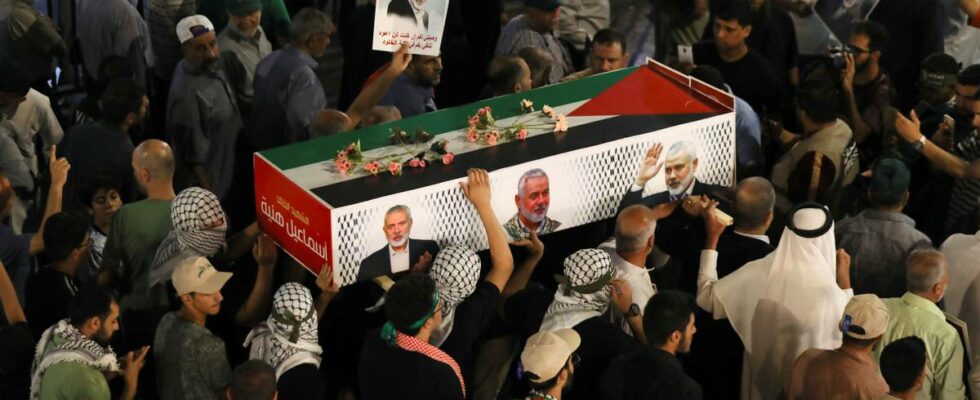US Secretary of State Antony Blinken warned that an Iranian attack on Israel was a few hours away. Now two weeks have passed and everyone is still waiting. – This is such a high risk for all parties involved. Iran knows that in a direct confrontation with Israel, especially if the US is involved, they are militarily much weaker. That’s what Prio researcher Jørgen Jensehaugen says. Predicted “powerful and painful” response Hamas’s political leader, Ismail Haniyeh, was killed in an attack in the Iranian capital Tehran on 31 July. It is believed that Israel was behind the attack, but this has not been officially confirmed by the Israeli government. – The Zionist regime has inflicted a severe punishment on itself. It is our duty to avenge the blood of Haniyeh, Iran’s Supreme Leader Ali Khamenei wrote the same day. The Iranian Revolutionary Guards also announced that they would respond “strongly and painfully”. Ismail Haniyeh was killed in Tehran on 31 July. It is believed that Israel was behind the attack. Photo: AFP The night before, Hezbollah’s military leader, Fuad Shukr, was also killed in an Israeli drone attack in the Lebanese capital Beirut. The Lebanese Hezbollah group is supported by Iran. Many have believed that they are preparing to respond to the attacks together. Major airlines canceled flights to Israel and Lebanon. And several countries have evacuated diplomats and asked their citizens to leave Beirut. In addition, the United States has sent additional combat aircraft and warships to the Middle East. Last Monday, a spokesman for the US National Security Council, John Kirby, said they believed an Iranian attack would come this week. The murders of Haniyeh and Shukr sparked a wave of demonstrations. Here from Sanaa in Yemen. Photo: Reuters An opportunity to put pressure on the negotiations Only a cease-fire in Gaza can convince Iran to refrain from attacking Israel, Iranian spokesmen said on Tuesday. They referred to the peace talks in Doha, Qatar, which began on Thursday. Hamas has chosen not to participate in the talks where Qatar, Egypt and the United States are acting as peace brokers. Jensehaugen believes that the threat of an attack is a way for Iran to participate in the negotiations without actually participating. Jørgen Jensehaugen is a senior researcher at the Peace Research Institute (Prio). He focuses largely on the Arab-Israeli conflict. Photo: NTB – This is an opportunity to put pressure into the negotiations, while also being a potential way out for Iran. If they manage to do it, then it is a huge diplomatic victory for Iran. – But it should be added that this is quite a high stake from Iran. If these cease-fire negotiations fail, then Iran has more or less said it will attack, he adds. No longer just a support front for Hamas Middle East researcher at UiO, Dag Henrik Tuastad, believes a response will come regardless of the peace negotiations. It is because Iran has now been attacked on its own soil, which Tuastad calls a humiliation. – Now they are in a direct conflict with Israel and no longer just a support front for Hamas. In that sense, it is unrelated to the peace negotiations. Dag Henrik Tuastad is senior lecturer in Middle Eastern studies at the University of Oslo. Photo: Frode Fjerdingstad Tuastad also points out that the Hamas leader in Gaza, Yahya Sinwar, wants more fronts against Israel to be opened. – The probability that he is willing to accept a cease-fire agreement, just before an attack by Hezbollah or Iran, is small because it is contrary to his military strategic thinking. On August 6, Yahya Sinwar was appointed as the new leader of Hamas. He does not want a truce, according to Tuastad. Photo: Mahmud Hams / AFP At the beginning of July, reformist Masoud Pezeshkian became Iran’s new president. He replaced Ebrahim Raisi, who died in a helicopter crash on 19 May. But what happens in Iranian politics is unlikely to have much significance for the announced attack, believes Tuastad. In Iran, it is the country’s supreme leader, Khamenei, who makes most of the decisions, he says. – Pezeshkian really wanted a more moderate line and openness towards the West. But the supreme leader has said they will respond to the attack on the Hamas leader. Internal disagreements Sverre Lodgaard, senior researcher emeritus at Nupi, however, believes that internal disagreements can play a role. Sverre Lodgaards is senior researcher emeritus at the Norwegian Institute of Foreign Policy. Photo: Christian Breidlid Partly because an attack against Israel could backfire on Iran’s economy, which is already affected by massive sanctions. Lodgaard predicts dissatisfaction among the population if Iran steps wrong. – It is conceivable that a counterattack could affect oil production. Because despite the sanctions, Iran produces and sells a good amount of oil. If Israel were to attack Iranian oil facilities, it would be bad news for the country. – The president has primary responsibility for the country’s economy. So it is basically his role to say what considerations should be taken in that context. – An answer will come – Waiting at full throttle is also a punishment for Israel. Lodgaard says there is a possibility that this could slip, but he is not very optimistic. – It is more serious than it was last time. There is heavy symbolism in this. It is as if they are saying that Israel can do anything to them. – So an answer comes. But I don’t want to speculate on how strong it will be or what it will entail, adds Lodgaard. Tuastad points out that Iran took two weeks to respond to Israel’s attack on an Iranian consulate in April. – That it doesn’t happen straight away is not unnatural or surprising. There is an element of psychological warfare in allowing Israel to live a little in that situation. Published 16.08.2024, at 12.28
ttn-69
Will Iran attack Israel? The experts answer – news Urix – Foreign news and documentaries

